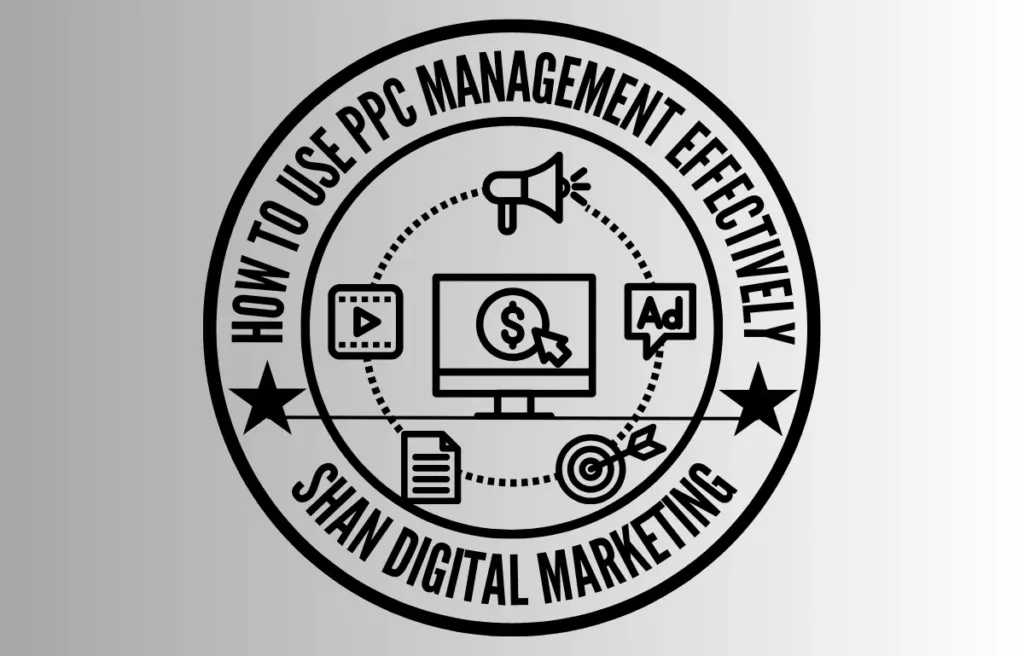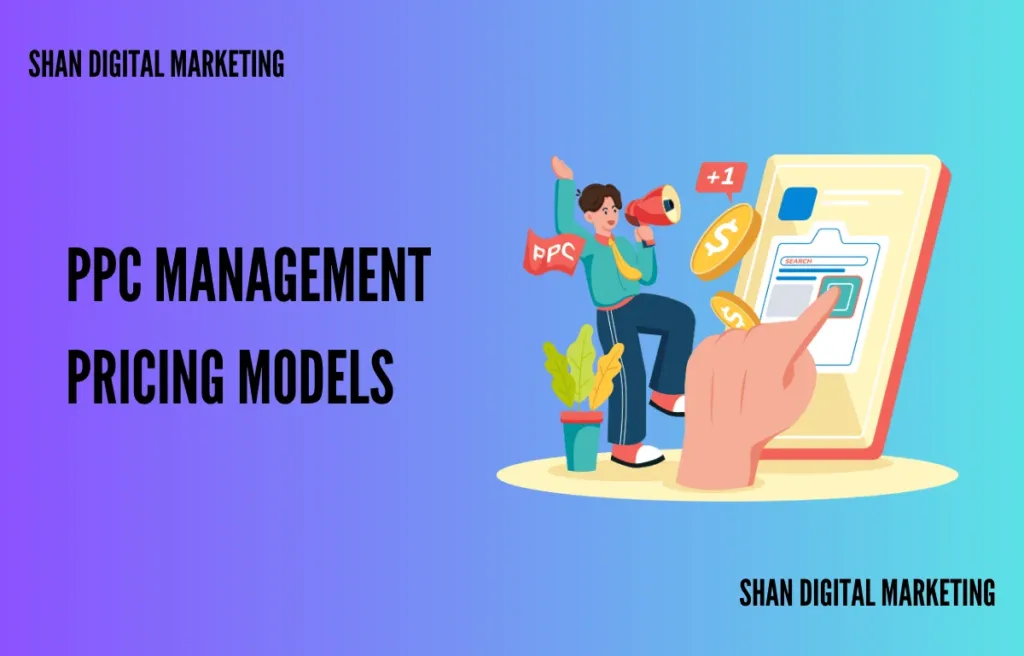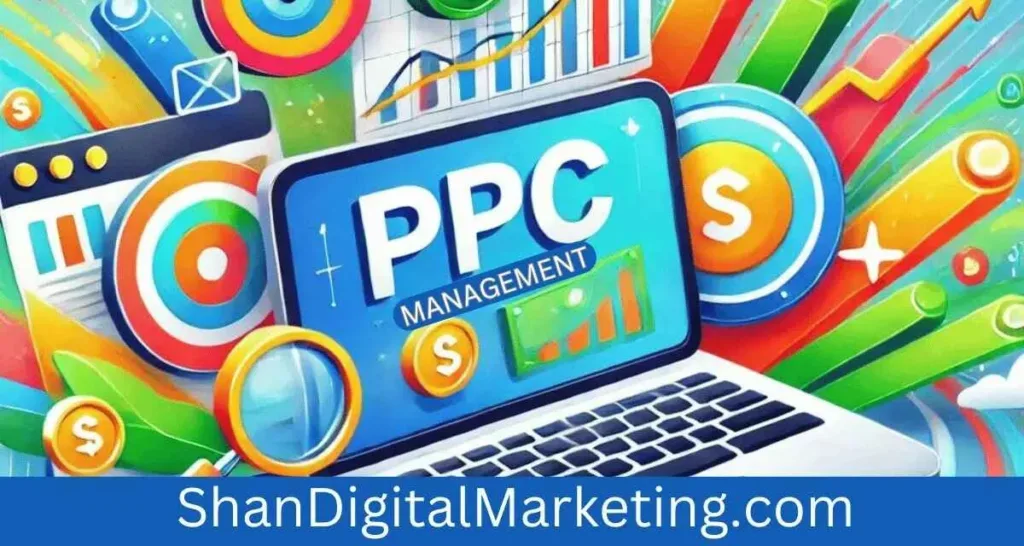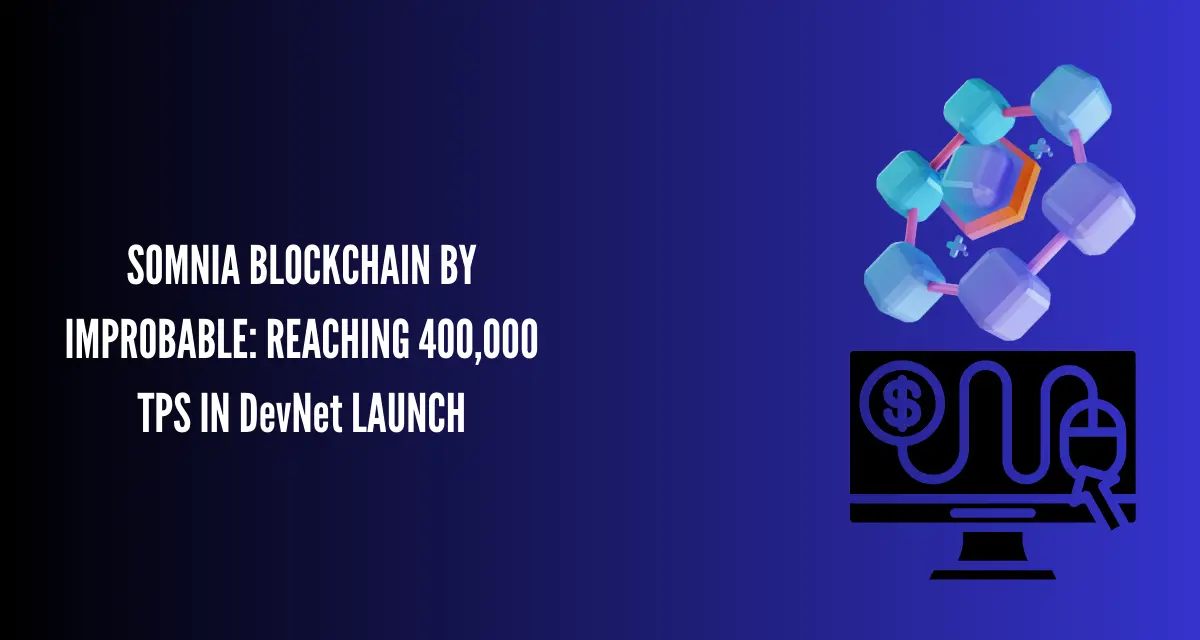Pay-per-click (PPC) is a powerful digital marketing tool that helps businesses pay for targeted actions like clicks or purchases. Millions of daily searches and heavy social media is being used, PPC offers to reach that customer by which traditional ads cannot. People still think PPC is risky and still rely on old billboards.
PPC offers exceptional results in exchange for your money and it can be costly. If done right it’s a low risk high return, exactly telling you how your dollars derive results. It is about the right strategy not about visibility.
Learning to run a PPC campaign is like putting your business to the right person at the right time. PPC management is the key to stay in the competition and make your money worth more, as Ads spend is increasing every year.
What is PPC Management?
Pay-Per-Click (PPC) management involves optimizing a company’s ad spend so that the effectiveness of their online advertising campaigns is maximized. It can be done by an individual in-house member or external specialized agency. When only a potential customer clicks on a businesses PPC campaign only then they are bound to pay, with various mindsets and plans such as driving sales, generating leads, increasing website traffic, building brand awareness, or promoting an app.
Effective PPC management requires careful planning, including keyword selection, SEM strategies, ad copy, and continuous optimization. Because of its complexity many businesses choose to work with any specialized agency but we will tell you everything about it and ensure they make the most of your advertising budget.
Coorelated : The Real Guide To Internet Marketing: Learn Something New.
How Does PPC Work?
PPC campaigns work the same on all platforms , which follows a general procedure which includes selecting a campaign type, refining targeting settings, setting a budget, and creating the ad. Once PPC is launched, platforms like Google use algorithms to determine ad placement and cost based on factors like budget, bid, and ad quality. Advertisers need to create relevant, high-quality ads that align with the platform’s standards in order to achieve better results from low budgets.
What is the Purpose of PPC Management?
Optimizing their advertising budget and boosting ROI by effectively managing cost-per-click ads of organizations is the main purpose of PPC Management.
By directing users to relevant content, PPC management enables potential customers to explore products or services easily. By this the chances of getting the potential customer increases.
What are the Benefits of PPC Management?
PPC management boosts visibility by placing ads at the top of search results, attracting more potential customers. It’s cost-effective, as businesses only pay when users click, driving potential sales. PPC also streamlines marketing by giving better control over ad placements, keywords, and budgets while complementing SEO efforts to increase overall site traffic and revenue.
How to Use PPC Management Effectively

Strategizing channels
Marketers choose websites, like search engines and social media, to host PPC ads based on their products or services. They may also use affiliate networks to reach audiences with similar offerings
Researching Keywords
Marketers begin PPC campaigns by researching keywords related to a company’s products or services that rank high in search results. They identify a target audience and use tools to find the most frequently searched terms by potential customers.
Create a Landing Page
A landing page is a dedicated webpage on a company’s site that highlights key details about its products or services, such as pricing. It is important to know how many users clicked on ad and later on made a purchase
Set Goals
- You should set goals according to the organization’s goals and implement short and long-term campaigns as objectives for a PPC campaign helps guide task management and fund allocation.
Monitor Ad Spend
Monitor daily ad spending to ensure a company’s PPC campaign delivers a good return on investment. Using specialized tracking software can help assess ad performance, keyword effectiveness, and overall sales, while also identifying which ads rank well on search engines or social media.
Plan Long-Term Campaigns
Long term PPC campaigns always give the best results, It ensures consistent high rankings on search engines through quality strategies and monitoring. Regularly updating ads, bidding on new keywords, and using split testing can help refine and expand the overall PPC strategy
PPC Channels and How They Work
Search Advertising
Search advertising uses PPC campaigns on platforms like Google and Microsoft, making it highly effective for service and local businesses targeting customers actively searching for their offerings. For instance a bakery business can appear first in local searches like “custom cakes near me,” by using search advertising.
Social Media Advertising
Social media advertising on platforms like Facebook, LinkedIn, and X uses a visual and passive approach, targeting audiences based on interests and behaviors rather than keywords. It’s great for brand awareness and can drive strong profits with effective strategies.
Display Advertising
Display advertising utilizes visual ads across websites in networks like Google Display, allowing your business to reach relevant audiences as they browse their favorite sites. With strong targeting based on demographics, interests, and locations, you can effectively engage prospects. While this approach cannot drive direct sales like easy search ads. But it offers a great brand exposure at lower costs.
Monitoring and Optimizing Campaigns
Monitoring Campaigns
In a PPC management campaign, marketers track keyword performance to identify which terms trigger ads and adjust accordingly if some keywords underperform. They regularly assess keyword costs against the campaign budget and make daily adjustments as needed to align with evolving campaign goals.
Analyzing Competitors
Marketers analyze competitors’ PPC strategies to bid on key search terms ahead of them and improve their own rankings. By studying rival ads, they can also gain valuable insights to enhance their own advertising content.
Optimizing Campaign Strategies
Marketers can improve their strategies by analyzing campaign elements, such as which ads boost ROI and which demographics drive more sales. For example, a restaurant might focus on local keywords to attract nearby customers based on their purchasing habits.
Split Testing
Split testing helps marketers compare different elements of PPC ads, such as graphics and text, to find what drives more traffic and improves ROI. This method also aids in optimizing website home pages and refining future advertising strategies.
How PPC Management Can Level Up Your Business and Increase Revenue
Expand Your Reach and Visibility
If your brand isn’t well-known, many potential customers might not be aware of it, especially if you haven’t used PPC. By placing well-targeted ads, you can reach a significant portion of the market actively searching for products like yours, expanding your brand’s visibility and capturing attention from new customers.
Gain Qualified Inbound Traffic
PPC advertising offers unmatched lead quality by targeting users actively searching for your product, ensuring high relevance. Whether through search engines or social media, audience targeting guarantees that viewers have interests closely aligned with your offerings, making each prospect a genuine potential customer.
Develop a List of Potential Customers
Unlike traditional ads where you lose contact with prospects who don’t immediately respond, PPC allows you to use remarketing to reach users who have clicked on your ads before. Additionally, anyone who shows interest but doesn’t purchase is entered into your CRM, enabling you to follow up and keep your sales pipeline active.
Diversify Your Audience
PPC advertising benefits from each platform’s unique user base, allowing you to reach potential customers who may not be found through traditional methods or other advertising channels. By trying various PPC campaigns, you can uncover new audiences interested in your business that you might otherwise miss.
Get Results You Can Measure
PPC advertising offers unparalleled transparency, allowing you to track exactly how much you spend on each click, lead, impression, and sale. This level of detailed reporting helps marketers continuously optimize campaigns, ensuring every dollar is used effectively and allowing for precise adjustments to maximize profit margins.
Maximize Your Budget
PPC provides detailed insights into performance, but the real value comes from automated bidding strategies. These strategies, such as targeting specific cost-per-action or return on ad spend, help ensure that clicks translate into tangible revenue.
Automated bidding allows business owners to optimize for various goals, like maximizing conversions or clicks, while staying within their budget. This low-risk approach ensures you only spend what’s necessary to achieve your desired results.
Actionable Strategies to Boost Revenue
Optimize Your Site for Mobile
With millions of mobile users browsing the web, ensuring your site is mobile-friendly is essential. If visitors find your site hard to read or navigate on their phones, they’re likely to leave and turn to a competitor.
To keep mobile users engaged, design your site to be easily readable and navigable on small screens. Make sure it loads quickly and offers a smooth user experience, so visitors can find what they need without frustration.
Create Text Ads
Text ads are a prevalent form of online advertising, typically consisting of brief text and a link to the advertiser’s site. These ads appear on search results pages and various Google networks, including websites, apps, and Google’s own platforms like YouTube and Gmail. To maximize their effectiveness, include relevant keywords, address customer pain points, highlight product benefits, use ad extensions, and include compelling calls to action.
Create Native Ads
Ad Blocking is growing, with many users avoiding traditional ads. Native ads work around this by blending in with website content, looking like regular articles or videos. To make your native ads effective, design them to fit your audience’s interests, use catchy headlines, engaging visuals, and keep them consistent with your brand. Make sure they provide useful content, link to your site, and work well on all devices.
Make Sure Your Ads Look and Sound Like Organic Results
PPC ads are often the first touchpoint for potential customers, so they need to be engaging and sound natural rather than pushy. Crafting ad copy that feels conversational can make your ads more compelling and relatable.
With the rise of natural language processing (NLP) and voice search, it’s crucial to adapt your PPC strategies. Consumers increasingly use complete questions and voice queries, so ensure your ads use clear, concise language and relevant keywords to meet their needs.
A/B Test Your CTAs
- If your PPC campaigns aren’t delivering the results you hope for, A/B testing can be a game-changer. This process involves comparing two versions of an ad or other content to see which performs better, focusing on elements like text, colors, and CTAs.
To get the most out of A/B testing, be specific about what you’re testing, such as wording or visuals, and vary your CTAs to see what matches best with your audience. Measure your results over a set period, then use the insights to refine and optimize your ads.
Use Negative Matching Techniques
- Managing your PPC campaign effectively includes using negative keywords to avoid wasting money on irrelevant clicks. By adding terms you don’t want your ads to show up for, you can improve targeting, save costs, and boost conversions, as seen with companies like Nuventra.
To identify negative keywords, use tools like WordStream, Google’s keyword planner, or Ubersuggest. These tools help you refine your keyword lists by excluding terms that don’t match your business, ensuring your ads are shown only to relevant audiences.
Different Types of PPC Agencies
The PPC industry includes a wide range of agencies, from those offering a broad spectrum of online marketing services to specialized firms focusing on specific platforms like Google Ads. When choosing a PPC partner, you’ll encounter various types, such as paid social agencies for platforms like Facebook and TikTok, retargeting agencies aimed at increasing conversions, and digital marketing agencies that cover everything from SEO to influencer marketing.
Other options include PPC agencies that manage ad performance and budget, and search engine marketing agencies that handle both SEO and PPC to improve search rankings.
Who Should Hire a PPC Management Company?
Hiring PPC management experts might seem costly, but it can greatly improve efficiency and drive better results, especially for businesses new to online advertising, those lacking dedicated teams, or smaller companies with limited resources. With their expertise and industry connections, these firms help level the playing field, allowing smaller businesses to compete more effectively with larger competitors.
How to Choose a PPC Management Agency
PPC agency selection for your project goes beyond pricing. It’s important to evaluate some factors given below to ensure a good partnership:
Services Offered
Some agencies specialize only in PPC, while others provide broader marketing services, allowing for a more integrated strategy. Choosing a full-service agency can help align PPC with your other marketing campaigns for better overall results.
Qualifications and Experience
When choosing a PPC agency, be cautious of those with unusually low rates, as it could indicate a lack of experience or qualifications. Verify their credentials, certifications, training, and case studies to ensure they have a proven track record of success with businesses similar to yours.
Communication and Culture
- Choose a PPC agency that aligns with your company culture and values, functioning as an extension of your team. Schedule a consultation to ensure their communication style, reporting frequency, and workflow meet your expectations.
The State of the PPC Industry
PPC marketing is here to stay, with advertising revenue projected to surpass $1 trillion by 2027. As over 60% of PPC activity comes from mobile devices, optimizing for mobile is more crucial than ever.
How Much Does PPC Management Cost?
Clients usually spend between $1,500 and $10,000 per month on PPC management, with larger companies potentially exceeding this range. The average cost per click is between $2 and $5, and businesses often allocate 10-20% of their ad spend to management fees.
With effective PPC management, clients often see significant returns, averaging a 4.5X ROI. Despite these general figures, actual costs can vary based on multiple factors, so it’s essential to understand different pricing models for a clearer picture.
PPC Management Pricing Models

There are four common agency models mentioned below:
Flat Fee
Percentage of Ad Spend
Performance-Based Fees
Hybrid Model
Let’s discuss each and every one :
Flat Fee
The flat fee model involves paying a consistent monthly fee for PPC management, often with an initial setup cost. Some experts use a tiered system where the fee scales with your PPC budget, such as $500 for a $5,000 budget and $1,000 for a $10,000 budget.
Percentage of Ad Spend
Agencies often charge a fee based on a percentage of your ad budget, usually 10-20%, but it can go up to 30% with top experts. This model may be challenging for small businesses with tight budgets, as they might not meet the minimum spending requirements.
Performance-Based Fees
Performance-based pricing models charge fees based on specific actions like demo requests or lead submissions, linking your costs directly to potential new business. A step further is milestone pricing, which evaluates various performance metrics such as website traffic and sales to determine fees over time.
Hybrid Model
Agencies often adjust their pricing based on the client’s needs, offering flat fees for startups with smaller budgets and percentage-based fees for larger campaigns. Some also provide additional services beyond the basic management fee, like campaign setup, though these add-ons can make costs less predictable compared to a straightforward monthly fee.
What’s Included in PPC Management Pricing?
This included all tasks associated for the launch of PPC campaigns :
Campaign Development and Strategy
Before launching a PPC campaign, research is essential to understand your audience’s behavior, preferred channels, and relevant search terms. Key tasks include keyword analysis, audience research, channel management, and defining campaign goals to shape your strategy.
Once the strategy is set, the PPC team sets up the account structure, creates ad copy, manages bids, and establishes remarketing criteria to optimize ad performance and budget efficiency.
Performance Reporting and Analysis
Performance reporting measures key metrics such as traffic, conversions, and ROI, revealing campaign effectiveness. These insights help refine PPC strategies to boost engagement and profitability.
Ongoing Optimization
Initial ad campaigns may attract traffic, but sustained success requires ongoing management like keyword updates, ad refreshes, and A/B testing. Regular optimization efforts ensure your campaigns stay effective, showing why a good agency’s workload goes beyond just setting up ads.
CPC by PPC Network
When it comes to PPC marketing, many think of Google Ads, but costs vary across industries and platforms. CPC rates differ by network, like Google, Pinterest, Instagram, and LinkedIn, each with unique average costs separate from management fees.
Is PPC Management Worth the Price?
PPC advertising is projected to reach over $132 billion in 2027, with many companies investing due to its high ROI potential. Effective management, like that seen with Datadog, can significantly boost key metrics like sales demos, CTR, and reduce CPA, leading to impressive returns.
What Factors Affect PPC Management Pricing?
Factors like industry, service area, competition, and speed to goal can all impact PPC costs. A good agency will assess your needs and offer a tailored plan with a flat fee that covers performance and maintenance, ensuring a custom approach that fits your business goals.
PPC Management Frequently Asked Questions
Who Should Hire a PPC Manager or Agency?
If you’re looking for immediate results rather than waiting for SEO, hiring a PPC manager or agency can be a great option. A PPC agency helps you spend your budget effectively, leveraging their expertise to drive targeted traffic and implement a strong advertising strategy.
Can You Manage Your Own PPC Campaigns?
Managing your PPC campaigns yourself can lead to trial and error and potential financial setbacks. Hiring a digital agency brings the skills and strategy needed to run more successful campaigns from the start.
What Are the Top E-Commerce PPC Marketing Management Tips?
You can optimize your PPC strategy by identifying relevant keywords, creating targeted e-commerce ads, and using segmentation and remarketing techniques. Testing ads, advertising on multiple channels like Facebook and YouTube, and leveraging Google AdWords or Bing Ads for SEO can further expand your campaign’s reach.
Does a PPC Manager Help You Decide How Much to Spend on Paid Ads?
A PPC manager offers guidance on your goals, detailing metrics like cost per acquisition and cost per click. Ultimately, you have the final say on how much of your budget to allocate to PPC.
Conclusion: PPC Marketing Management
PPC management is key to attracting leads and growing your business, but it can be tricky for beginners. Using PPC tools helps, but an experienced agency can navigate the complexities and avoid costly mistakes, ensuring your budget is spent wisely and your ROI is maximized.
Author

Sophie is our seasoned SEO Expert , navigating the intricacies of algorithms with finesse. With a wealth of experience, she ensures your digital presence ascends to the top ranks, one optimized keyword at a time.
View all posts






